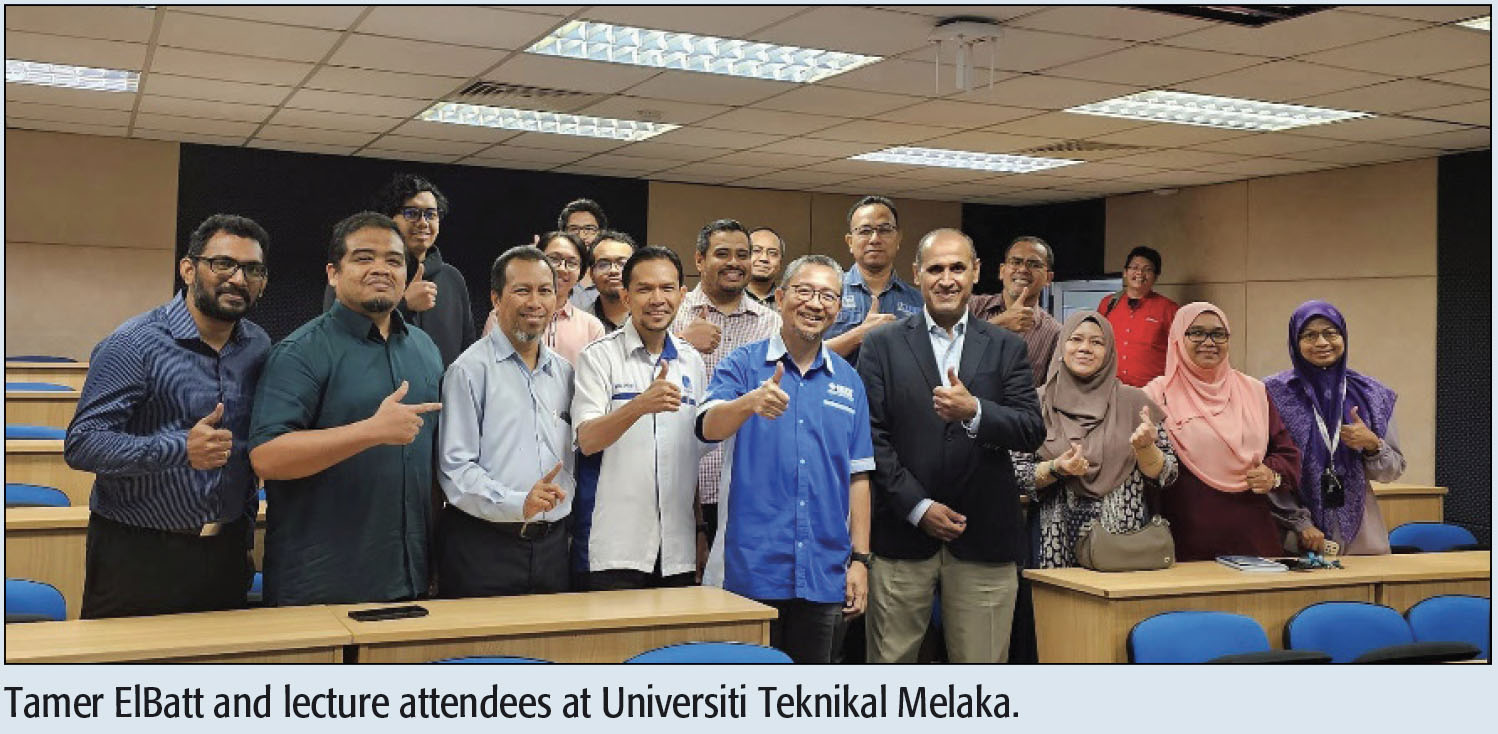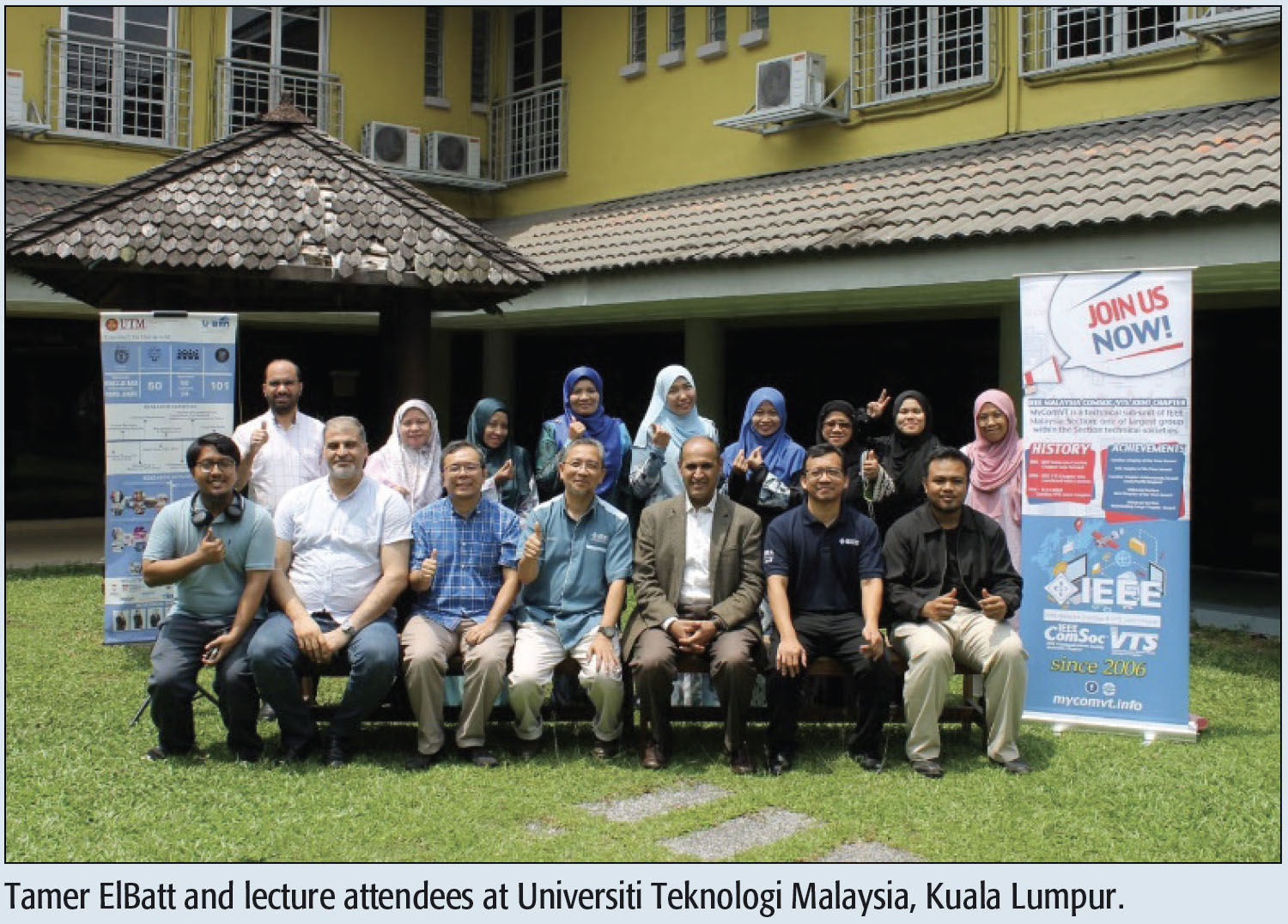
The IEEE Malaysia Communications Society & Vehicular Technology Society (ComSoc/VTS) joint Chapter successfully organized the IEEE ComSoc Distinguished Lecturer Program (DLP) by Prof. Tamer ElBatt from the American University in Cairo (AUC), Egypt for 3 days from 21st August to 23rd August 2023. 3 different talks were organized at 3 different venues. This is the first time that a physical DLP event has been conducted in Malaysia after the pandemic.
Prof. Tamer ElBatt is currently a Professor at the CSE Department at the American University in Cairo (AUC). He has published more than 140 papers in major journals and international conferences and holds seven issued U.S. patents and one WIPO patent. Dr. ElBatt served on the TPC of numerous IEEE and ACM conferences. He is currently a ComSoc Distinguished Lecturer, the recipient of the Google Faculty Research Award in 2011, the 2012 Cairo University Incentive Award in Engineering, and 2015 Egypt’s State Incentive Award in Engineering. His research interests lie in the broad areas of modeling, performance analysis, design and optimization of wireless networks, mobile computing, and IoT.

The first talk on Monday 21st August 2023 was on “Machine Learning and Edge Intelligence: Key Enablers for xG Wireless and IoT.” The talk was co-organized together with the Wireless and Photonic Networks (WiPNET) Research Centre, Department of Computer and Communication Systems Engineering, Faculty of Engineering, Universiti Putra Malaysia (UPM), and IEEE UPM Student Branch. The venue was the Faculty of Engineering, UPM in the state of Selangor. A total of about 48 participants both physical and online attended the talk.
In this talk, Prof. ElBatt has reviewed recent results based on his work in the areas of machine learning for wireless and IoT systems with Edge Intelligence. In particular, he touched upon a sample of his work on deep learning-based proactive caching, Q-learning-based wireless access, and IoT systems with edge intelligence. In the first part of the talk, he shed light on two samples of his work. The first is on deep learning-based proactive content caching using a public movie rating data set. Afterward, he shifted his attention to a reinforcement learning problem formulation for channel access in dynamic spectrum access networks exploiting the primary user feedback. In the second part of the talk, he moved to the emerging paradigm of edge intelligence with a focus on IoT. His research group has designed and prototyped a multi-tier system, with distributed machine learning, for a use case of vehicle tracking based on data captured by roadside cameras.
The second talk was conducted on Tuesday 22nd August 2023. The second venue is slightly further from the capital Kuala Lumpur and it was held in the historical state of Melaka. The host of the second talk is the Wireless Broadband and Networking research group, Faculty of Electronic and Computer Engineering, Universiti Teknikal Melaka (UTeM). The title of the second talk was “Edge Computing and Communications: Fundamental Limits and Applications in Wireless Caching and IoT.” The talk was attended by about 36 participants both physical and online.

For the second talk, he reviewed his recent work on edge computing and communications as a key enabler for future wireless networks. In particular, he presented samples of his work on proactive caching, decentralized coded caching, cache-aided MIMO networks, and edge networking for IoT and D2D communications. In the first part of the talk, he shed light on samples of his work on edge content caching, e.g. proactive, on-device caching. In addition, he presented performance limits for decentralized coded caching in Fog Radio Access Networks with a focus on the normalized delivery time (NDT) performance metric. Afterward, he extended his discussion to cache-aided MIMO networks where he generalized prior studies to the case of an arbitrary number of transmitters, receivers, and antennas. In the second part of the talk, he shifted his focus to edge networking with applications to IoT systems and opportunistic D2D communications. He presented the proposed multi-tier IoT system, with distributed machine learning, for a vehicle tracking use case.
The last lecture was delivered on Wednesday 23rd August 2023 entitled “Green Wireless: Optimization of Wireless Networks with RF Energy Harvesting.” The venue for the last talk was the Universiti Teknologi Malaysia (UTM) Kuala Lumpur Campus. This time the co-organizers were the Ubiquitous Broadband Access Network (U-BAN) Research Group, UTM, and IEEE Kuala Lumpur Subsection. The talk was attended by approximately 28 participants both online and physical.
In the last talk, he reviewed his work on energy-harvesting wireless networks towards 6G and beyond. In particular, he touched upon sample work on RF energy harvesting wireless networks, e.g., wireless powered communication networks (WPCNs), Slotted Aloha with RF energy harvesting, and simultaneous wireless and information power transfer (SWIPT) with Hybrid ARQ. In the first part of the talk, he shed light on two samples of his group’s work on WPCNs. The first is on the optimized design of WPCNs with two types of nodes, namely RF-powered nodes and legacy nodes. It reveals interesting insights about the performance and fairness of the studied system compared to prior work with RF energy harvesting nodes only. He then presented WPCNs with non-orthogonal multiple access (NOMA) and proposed approximate solutions due to the sheer complexity (non-convexity) of the formulated problems. In the second part of the talk, he focused on establishing fundamental limits for Slotted Aloha with RF energy harvesting. He presented the developed model of interacting queues for a network with two user types. The main contribution is to establish an inner bound on the stable throughput region via generalizing stochastic dominance arguments proposed in the literature.
The IEEE Malaysia Communications Society & Vehicular Technology Society (ComSoc/VTS) joint Chapter is really glad to have Prof. Tamer ElBatt this time around in Kuala Lumpur. His sharing of the different topics has given new knowledge and experience to the participants.